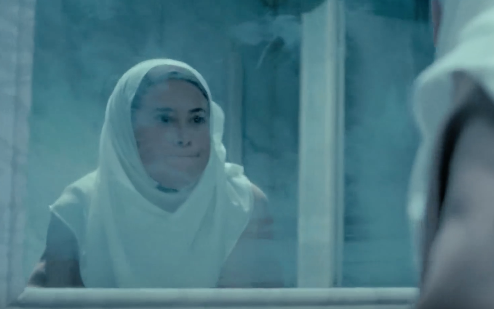Egyptian Feature Film Tackles Social Stigma of Women with AIDs
By: Joya EL Aggar
Follow @joyaelaggar
In a society where AIDs patients are often stigmatized and marginalized, Egyptian drama film Asmaa challenges this stereotype.
The 2011 feature is the first in Egyptian film history to humanize patients and depict their struggle in an empathetic light.
The film, written and directed by Amr Salama, was screened in the Shafik Gabr Hall on October 25 by Heya: The Feminist Initiative.
The film’s storyline revolves around the protagonist Asmaa, an HIV patient who struggles to live with her disease in a society that has historically alienated AIDS patients.
Asmaa’s struggle is hardened by her social standing; the lack of socioeconomic resources has been documented to produce greater health risks, including exposure to HIV/AIDs, according to the American Psychological Association.
The film tackles the stigma that those who suffer from AIDs engage in sex work and prostitution. Asmaa herself is constantly accused of promiscuity, which complicates her relationship with her daughter.
Asmaa keeps the disease a secret from her daughter, Habiba, in order to avoid having to explain how she contract the disease from her husband.
After she gets a gall bladder infection, doctors refuse to operate on her because of her HIV.
According to the Egyptian Initiative for Personal Rights (EIPR), medical professionals are reluctant to treat HIV/AIDs both because of their lack of professional training on the issue and because of a fear of stigma by association.
With widespread misconceptions that HIV can only be transmitted sexually, the film aims to raise awareness about the taboo surrounding the disease, specifically when women are affected.
The film also tackles the negative effects HIV has on patients — like the psychological and physical damage of both the disease itself and the societal reaction.
Throughout the movie, we see Asmaa resorting to several painkillers and injections to help her deal with her pain in light of the absence of professional medical treatment.
Only 22 percent of Egyptian women with HIV/AIDs are receiving antireteroviral therapy (ART), according to UNAID’s 2016 country report on Egypt.
Asmaa’s employer at the Cairo International Airport conitnuously demands to see her medical record after he notices a change in her behavior at work.
After being assured that she cannot be legally fired for having AIDs, she agrees to share them with her employer.
Although he does not in fact fire her, he reveals her disease to her fellow employers prior to asking them if they wanted to continue working with her.
In the face of such social stigma, Asmaa leaves her job.
A charitable foundation offers to treat her if she reveals how she contracted the disease, but Asmaa insisted on every person’s right to treatment regardless.
Throughout the film, Asmaa finds solace in a HIV support group, led by talk-show host Mohsen el-Seesy, who tries to persuade Asmaa to reveal her true identity and tell her story on his show.
Although initially reluctant, the film ends with Asmaa’s decision to appear on the show and tell the world her story, prompting the anchor to give her EGP 300,000 to travel abroad for her surgery.
Some believe that Asmaa’s decision to appear on television is an indirect message, calling on women to ask for their rights within the society.
The storyline is based on a true story in which the woman eventually passes away.
The film received several reactions from the attendees, who totalled just under 20 students.
Some expressed their despair towards what Asmaa had to endure, while others stated how sad they are over the incorrect stereotypes prevalent in society that denies some people their basic rights.
“She was afraid of how the people were going to look at her or think of her. She did not care about her pain because of her reputation,” said anthropology student Ahmed Ibrahim.
“Heya’s vision this year is to contextualize feminist issues within the Egyptian framework,” Heya’s President Farah Abdul Gawad told The Caravan.




